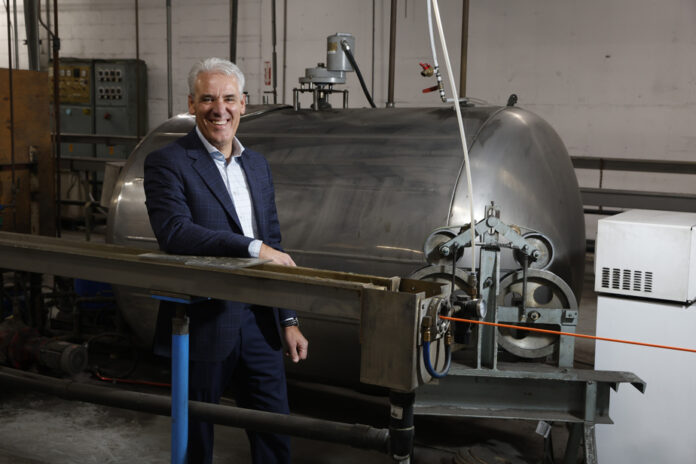In 1992, Benoît Frappier created his own company by launching into the manufacture of snares for traps. Thirty years later, with its nine factories and three distribution centers in Canada and the United States, Ben-Mor is the largest manufacturer of assembled steel cables and lifting slings in the country. The company now intends to reduce its dependence on China by continuing to grow in the United States and diversifying its markets.
Like many entrepreneurs before him, Benoît Frappier began his activities in the carport adjoining his house. Responsible for sales in a factory manufacturing steel cables, he decided to go on his own by manufacturing snares for hunting, an activity still popular at the time.
Quickly, however, he redirected his activities when he met Ben Weider, a former champion bodybuilder, who had started manufacturing exercise machines.
“It got big. They started with four people and grew to 1800 employees. I made them black cables and fasteners to lift the weights of their devices, this quickly represented more than 80% of my business volume, I had to diversify,” says Benoît Frappier.
From its factory in Saint-Hyacinthe, it develops other products, particularly for agriculture, and in 2001, the Ben-Mor company developed a plastic-coated steel dog tether hook. He achieves a monster success.
In 2006, Ben-Mor made its first acquisition in the United States by purchasing the Continental factory in New Hampshire, an official supplier to the United States government.
“It allowed us to get into very high-end production to serve the US military and the aerospace industry. Everything is made with American products, there is no question of having foreign suppliers there, “says Benoît Frappier.
Ben-Mor continued to grow by making acquisitions in Canada and opening distribution centers for hardware stores in Boucherville, Calgary and Chicago. The group now employs 375 people in its various facilities.
Over the years, the company has gone on to manufacture a host of different products, from clothesline and cables for the aeronautic industry, to trailer chains with covered cables and Kevlar slings which allow lift wind turbines.
“We made over 8,000 different products. It is always steel cables or technical fabrics that are assembled by us. Today, we have more than 1500 different products in stock in our distribution centers and more than 500 for our industrial customers.
The mining sector is an important customer of Ben-Mor, which supplies it with the steel cables used for drilling during exploration work with fine cables of 2,000 to 3,000 feet in length which are installed in the core barrels.
Ben-Mor also manufactures slings from engineered materials that are 10 times lighter than steel and have superior lifting capacity.
The group has just finished manufacturing 1.4 million strings for the lighting system of a brand new attraction in Las Vegas.
For four years, Ben-Mor has sought to be less and less dependent on China as the main supplier of the raw materials used to manufacture its products.
“Five years ago, 80% of our raw materials came from China. Last year, we reduced this to 50% and we aim to reach 30% by 2025. Unfortunately, there is no Canadian supplier capable of supplying us with steel cable. The last Quebec manufacturer closed in 1999.
This desire for freedom is not unrelated to the 25% tariffs imposed by Donald Trump on steel products from China, which had influenced Ben-Mor’s business.
“Then there was the affair of the two Michaels. I started to be afraid. I often went to China to see my suppliers directly. We leave our passport at every hotel we go to, there are billions of cameras everywhere. I started to be afraid and an entrepreneur cannot be afraid.
“We will keep our Chinese suppliers only for commodity products, for the rest, we will develop new markets”, anticipates the founder of Ben-Mor.
Already, the Ben-Mor company has repatriated to Quebec the manufacture of millions of aluminum rings which are used to connect the steel cables, just as it has been manufacturing since January 1 at its Saint-Hyacinthe plant all the molds in plastic used in the manufacture of clothespins and other convenience products that it has subcontracted in Canada.
Ben-Mor celebrated its 30th anniversary last August and its founder is preparing to transfer ownership of the company to his daughter Mélanie, responsible for industrial sales and business development, and to Louis Tétreault, sales and supply chain manager.















